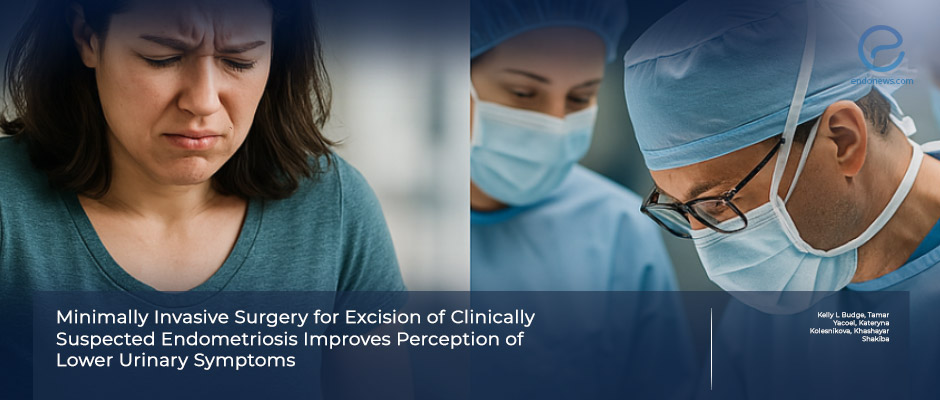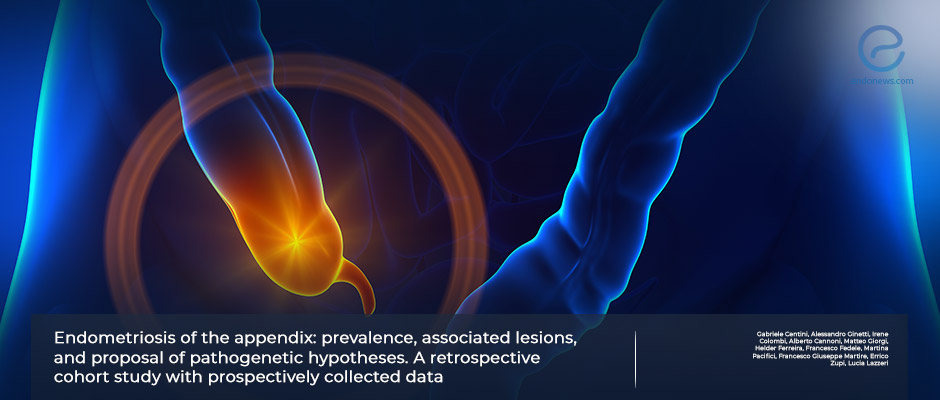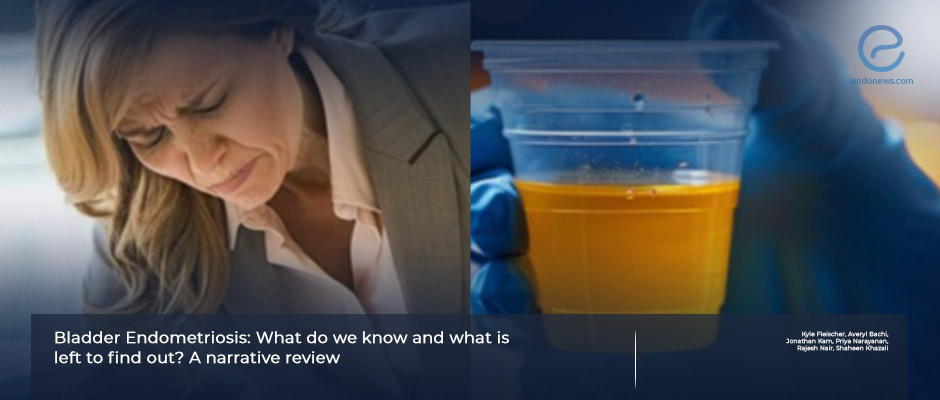Urinary Symptom Relief Following Excision of Suspected Endometriosis
Lower urinary tract symptoms such as frequent urination, urgency, and waking up at night to urinate, are often overlooked or dismissed in patients with endometriosis. A new study published in the Journal of Minimally Invasive Gynecology highlights that these symptoms may…
Key Points Lay SummaryAppendiceal Endometriosis Associated With Ovarian and Bladder Endometriosis
There is a significant association between appendiceal, ovarian, and bladder endometriosis, according to a new study published in the scientific journal Archives of Gynecology and Obstetrics. This could be explained by the spread of the disease via the shedding of…
Key Points Lay SummaryBladder Endometriosis: Current Knowledge and Future Directions
About 70-80% of urinary tract endometriosis occurs in the bladder, particularly affecting the base and dome regions. Endometriotic lesions can penetrate the detrusor muscle either partially or completely. Endometriosis affecting the uterovesical fold peritoneum or deep endometriosis that does not involve…
Key Points Lay SummaryBladder Function Alterations Following Endometriosis Surgery
Although endometriosis is a common gynecologic disorder, urinary tract involvement is present in only 1-5% of these patients. When endometriosis invades the urinary tract, clinical symptoms may vary from asymptomatic to frequency, urgency, bladder pain, hematuria, and recurrent urinary infections.…
Key Points Lay SummaryImportance of dynamic cystoscopy for bladder endometriosis.
Bladder endometriosis is a rare type of endometriosis but when diagnosed it requires extensive surgical procedures which include bladder resections. Thus, diagnosis and proper treatment are vital. In the study conducted in Brazil, the authors questioned the accuracy of applying…
Key Points Lay SummaryLaparoscopic resection of bladder endometriosis
When we talk about deep-infiltrating endometriosis, one of the most commonly affected organs in the urinary tract is the bladder, with a prevalence of 80%. Bladder endometriosis can be defined as the existence of the endometrial glands and stroma inside…
Key Points Lay SummaryThe accuracy of transvaginal ultrasound and magnetic resonance imaging for deep urinary tract endometrisis.
The prevalence of urinary tract endometriosis is 19-53% in patients within deep infiltrating endometriosis cases. The bladder and ureteral are the most common sites of the involvement. While preparing a radical surgery for a patient with deep endometriosis, the diagnosis…
Key Points Lay SummaryEgg or chicken, which is causing bladder symptoms, DIE or surgery for DIE?
Urinary symptoms could be overwhelming and sometimes could be hidden behind pain symptoms, but still might cause secondary damages on kidneys and bladder if remain undetected. In the prospective study conducted by Laterza et al, the authors questioned whether the…
Key Points Lay SummaryThe Surgical Management of Endometriosis of the Ureter and Bladder
Laparoscopic surgery is feasible and safe to manage endometriosis of the ureter and bladder, according to a new study published in the Journal of Minimally Invasive Gynecology. According to the authors of the study, ureteral resection is more strongly associated…
Key Points Lay SummaryExploring the Role of Neuropathy in Re-Operative Endometriosis - Marc Possover, MD, PhD
Prof. Possover starts his presentation by summarizing the possible cause of pelvic neuropathy following endometriosis surgery. Pelvic neuropathy is the damage or dysfunction of the pelvic nerve. Prof. Possover explained that this could either be due to incomplete surgery, disease…
Key Points Lay SummaryOperative techniques for Deep Endometriosis Surgery - Shaheen Khazali, MD
In this presentation, Dr. Shaheen Khazali, an endometriosis surgeon specialized in gastrointestinal and urinary tract endometriosis excision and in neuropelveology, talks about the general principles and some techniques for endometriosis surgery focusing on rectovaginal endometriosis. He also describes the "ten…
Key Points Lay SummaryUrological Challenges in Endometriosis Surgery - Guenter Noe, MD
In this presentation, Dr. Guenter Noé, Head of Department of Rheilandklinikum Dormagen in Germany talks about endometriosis affecting the urinary tract. Dr. Noé starts by describing the different parts of the urinary tract that can be affected by endometriosis including…
Key Points Lay SummaryFixing holes: prevention and treatment of complications - Jon Einarsson, MD, MPH
Dr. Einarsson shared his operating room video screens during his speech for discussing four major complications (ureter, bladder, bowel, and vascular) of endometriosis surgery and the ways to repair them. Fixing the ureter damage: Endometriotic nodules may settle on the tract…
Key Points Lay SummaryEndometriosis involving the Sacral Plexus and Sciatic Nerve
Endometriosis rarely involves the sacral and sciatic nerves. A retrospective analysis led by Rouen University Hospital, France and Aarhus University Hospital, Denmark, published in the Journal of Minimally Invasive Gynecology, has evaluated preoperative complaints, intraoperative findings, surgical procedures, and postoperative…
Key Points Lay SummaryThe advantages of combined vaginal-laparoscopic approach on voiding dysfunction for rectovaginal endometriosis
The patients with rectovaginal endometriotic nodules with extensive vaginal infiltration who are managed combined vaginal-laparoscopic approach have a lower risk of postoperative bladder dysfunction when compared to surgery via laparoscopy alone. This is according to a manuscript published in the…
Key Points Lay SummaryEndometriosis in the Urinary Bladder
A case of bladder endometriosis is reported by Geng JH, from Taiwan, and the paper has been recently published in The New England Journal Of Medicine. The patient was a 38-year-old woman presented to the outpatient urology clinic with complaints…
Key Points Lay SummaryWhich Diagnosis Technique is Better?
Transvaginal ultrasound provides a more accurate localization of vaginal and recto-vaginal endometriosis compared to magnetic resonance imaging (MRI) according to a study published in the International Journal of Gynecology & Obstetrics. However, MRI has better accuracy in detecting bladder endometriosis…
Key Points Lay SummaryThe postoperative functional outcomes of deep infiltrating endometriosis
Rectosigmoid endometriosis is defined as the infiltration of the bowel wall with the endometrial-like glands and stroma, reaching at least the muscular layer. The most commonly involved sites are the rectum and sigmoid colon. For the management of deep infiltrating…
Key Points Lay SummaryBladder Endometriosis
Bladder endometriosis is rare – about 1-2% of women with endometriosis may have endometrial lesions in their urinary tract. Diagnosis of bladder endometriosis is difficult because of its nonspecific symptoms such as frequent urination, pelvic pain, and burning sensation when…
Key Points Lay SummaryExtragenital endometriosis and ultrasound
Contrast-enhanced ultrasound (CEUS) is a non-invasive imaging method with no exposure to radiation. There are a few reports on the use of CEUS in the assessment of endometriosis in the literature. Dong et al. reported 3 histopathologically proven cases of…
Key Points Lay SummaryPersonalised Medicine for Endometriosis?
The lining of the uterus of women with endometriosis is different from that of women without the disease even if they have chronic pelvic pain found a study published in the scientific journal Biology of Reproduction. The difference is found…
Key Points Lay Summary"Kissing Round Ligaments" May Be a Sign of Bladder Endometriosis
Specific laparoscopic findings may help surgeons diagnose bladder endometriosis, a rare and often undiagnosed condition. Bladder endometriosis is thought to affect only around one percent of patients with endometriosis. However, this could be an underestimation and many cases may go…
Key Points Lay Summary
 By Özge Özkaya
By Özge Özkaya


 By Selma Oransay
By Selma Oransay


 By Bahar Yuksel
By Bahar Yuksel









 By Irem Onur
By Irem Onur


 By Timur Seckin
By Timur Seckin


 By Hale Goksever Celik
By Hale Goksever Celik

 By Demet Candaş Green
By Demet Candaş Green


